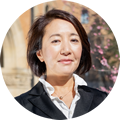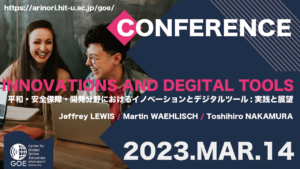【EN】SIGMA Global Active Learning – Managing the SDGs 2023
SIGMA (The Societal Impact & Global Management Alliance) is a global network of renowned universities in management and business fields, founded in 2016. The alliance seeks to promote interdisciplinary and inter-university collaboration in research and education. In 2019, SIGMA Global Active Learning was launched as an online course joined by all of its member schools. The course focuses on the Sustainable Development Goals (SDGs) and business.
- Copenhagen Business School (Denmark)
- Esade Business School (Spain)
- FGV/EBAPE (Brazil)
- Hitotsubashi University (Japan)
- Renmin University of China (China)
- Singapore Management University (Singapore)
- Université Paris Dauphine-PSL (France)
- Universität St. Gallen (Switzerland)
- WU Wien (Austria)

| Topic
The Sustainable Development Goals (SDGs), adopted at the UN Summit on Sustainable Development in 2015, consist of 17 goals that range from the end of poverty and hunger to climate action, clean energy, education and water, gender equality, among others, to be achieved by 2030. The SDGs, unlike the previous global agendas, involve all actors – national and local governments, civil society groups, and business actors – at every level of development, not limited to struggling economies. In this course, students will learn, and actively participate in discussions on, the role of market-led approaches to the SDGs. |
This class will be complimentary to other courses offered in international law, economy, business, politics, and social sciences.
Online Modules
Eight online modules will be provided on LearnPublic:
| Module 1 | Global Virtual Teamwork | (WU) |
| Module 2 | What are the SDGs? Origins and prospective | (ESADE) |
| Module 3 | From Social Problem to Business Model | (CBS) |
| Module 4 | Social Innovation and Systems Change | (SMU) |
| Module 5 | Responsible Global Leadership | (WU) |
| Module 6 | From Carbon Risk to Clean Energy Business Opportunities | (HSG) |
| Module 7 | Sustainable Cities and Communities for Social Inclusion | (Hitotsubashi University) |
| Module 8 | Reporting and the SDGs | (UPD) |
Group Projects
Parallel to taking the filmed lectures, students will carry out virtual group projects. Students will be divided and paired with others from participating schools to form a cross-national/institutional team of four to five. Each team will conduct a case study of a company or organization with tangible contributions towards the SDGs, evaluating their business models and their lessons learned, and develop a short video to present research findings. Team members work in close contact with one another, utilizing online meetings, emails, text messages, and other tools, to finalize their joint outputs. Each group will be guided by assigned advisors from the SIGMA member schools to facilitate the process.
This course is attended by approximately 100 students from the SIGMA member schools, and its first and last days will be the open forum for all participants to gather online. These open forums build a sense of unity among the participants, notwithstanding the virtual format of the course.

Course Goals
Managing the SDGs-SIGMA global active learning presents a number of opportunities unique to its global network.
① Lectures by world-class educational institutions
Students will benefit from lectures offered by the top-level universities in business-related fields around the world. Through geared towards business, their contents are not highly specialized, in which students from any discipline can participate.
② International communication
Students will advance cross-cultural partnerships by way of group projects. Collaboration with students from diverse backgrounds is a rare occasion made possible by the SIGMA structure.
③ Exposure to online education
Students will become familiar with a virtual learning platform. Given the unprecedented level of online communication, particularly as a result of COVID-19, this course offers a valuable opportunity to gain first-hand experiences with internet-based joint efforts.
Case Cast
In this assignment, students work in cross-university teams to elaborate a case analysis of a self-chosen example of sustainable business practice. This challenging task requires students to research, review and critically evaluate an organization’s strategy that addresses one or more SDGs.The group members need to organize their time by the others’ schedules and manage the steps of the project in a limited period.
The Case Cast is the final outcome of the group work. A 2.5-minute video pitch presented in a screencast PowerPoint presentation that explains the group’s proposal in a concise way.
Text Books
No reading materials have been assigned prior to the course.
Outside Activities
Students will engage in the group projects as outlined above.
Grading Criteria and Methods
There will be a quiz at the end of the online lectures to ensure that students have grasped their contents. The final grading of the course, which will be at the discretion of each participating school, will be either a Pass or a Fail, but the team that has produced the best video will be so acknowledged and announced at the final forum on the last day. After the course is over, students will reflect on their experiences and share them on Manaba.
Application Form
Please fill out this form and submit by 8 Sept 2023.
https://forms.gle/g3aSt6Nn3vV4ncna9
*Given the nature of inter-university group allocation, students are discouraged from dropping out once the course has commenced. Mid-semester withdrawal will be treated as ‘Fail’.
Know More
・article in Japanese:「SDGsをテーマに、第3期を迎えるSIGMAオンライン講義」(2020/06/22)
・article in Japanese:「SDGsをテーマに、オンラインで世界の学生と交流できる『SIGMA』」(2020/09/30)
・article in Japanese:「SIGMA学長会議が本学で開催されました」(2023/05/17)
Instructor
Sumie NAKAYA
The instructor has Ph.D. in Political Science from the City University of New York (New York, NY) and M.A. in Law and Diplomacy from the Fletcher School (Medford, MA). She has since worked with the UN Development Fund for Women (subsequently transformed into UN Women), the Conflict Prevention and Peace Forum at the Social Science Research Council, and the UN Department of Political and Peacebuilding Affairs and Department of Peace Operations. Her areas of expertise are conflict resolution, peace operations, and peacebuilding.

Email: sumie.nakaya@r.hit-u.ac.jp
Office phone: 042-580-9239
Office hours: By appointment
Office location: 3rd Research Building, East Campus, Room 207


